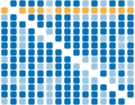The page of Trakl, Georg, English biography
Biography
Georg Trakl (February 3, 1887 – November 3, 1914) was a pre-eminent Austrian poet.Trakl was born and lived the first 18 years of his life in Salzburg. His father, Tobias, was a dealer in hardware, while his mother, Maria, was a housewife with strong interests in art and music.
Trakl attended a Catholic elementary school, although his parents were Protestants. He matriculated in 1897 at the Salzburg Staatsgymnasium, where he studied Latin, Greek, and mathematics. Around 1904, Trakl began to write poetry.
After dropping out of high school in 1905, Trakl worked for a pharmacist for three years and decided to pursue pharmacy as a career. It was at this time that he experimented with playwriting, but his two short plays, All Souls' Day and Fata Morgana, failed onstage.
In 1908, Trakl moved to Vienna to study pharmacy, and fell in with a group of local artists and bohemians who helped him to publish some of his poems. Trakl's father died in 1910, shortly before Trakl received his pharmacy certificate; thereafter, Trakl enlisted in the army for a yearlong stint. His return to civilian life in Salzburg was a disaster, and he reenlisted, serving as a pharmacist at a hospital in Innsbruck. There he also met the local artistic community, which recognized his budding talent. Ludwig von Ficker, the editor of the journal Der Brenner, became his patron: he regularly printed Trakl's work and endeavored to find him a publisher to produce a collection of poems. The result of these efforts was Gedichte (Poems), published by Kurt Wolff in Vienna in the summer of 1913. Ficker also brought Trakl to the attention of Ludwig Wittgenstein, who anonymously provided him with a sizable stipend so that he could concentrate on his writing.
On the outbreak of World War I, Trakl was sent as a medical official to attend to soldiers in Galicia (comprising portions modern-day Ukraine and Poland). His suffered frequent bouts of depression [citation needed], exacerbated by the horror of caring for severely wounded soldiers. During one such incident in Grodek, Trakl had to steward the recovery of some ninety soldiers wounded in the fierce campaign against the Russians. He tried to shoot himself from the strain, but his comrades prevented him. Hospitalized in Krakow and placed under close observation, Trakl lapsed into deeper depression and wrote to Ficker for advice. Ficker convinced him to contact Wittgenstein. On receiving Trakl's note, Wittgenstein went to the hospital, but found that Trakl had committed suicide from an overdose of cocaine three days before.
source :: wikopedia.org




